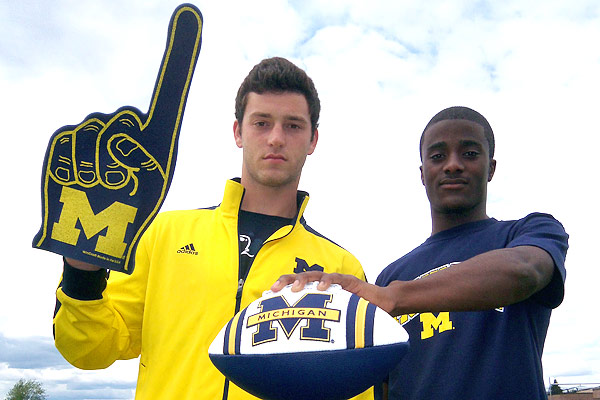Install the app
How to install the app on iOS
Follow along with the video below to see how to install our site as a web app on your home screen.

Note: This feature currently requires accessing the site using the built-in Safari browser.
-
New here? Register here now for access to all the forums, download game torrents, private messages, polls, Sportsbook, etc. Plus, stay connected and follow BP on Instagram @buckeyeplanet and Facebook.
You are using an out of date browser. It may not display this or other websites correctly.
You should upgrade or use an alternative browser.
You should upgrade or use an alternative browser.
2020 ttun Shenanigans, Arguments, and Surrender Cobras (Confirmed COWARDS!)
- Thread starter LordJeffBuck
- Start date
- Status
- Not open for further replies.
They are on a roll today.
Back to the 5'8 150 pound DB they are blowing their wads over
Only verified 40 time that I find for him is 4.50
The 4.3ish times DFBIA claim likely are highly inflated
Yea. Please put him on any OSU wr. ANY.
Upvote
0
ND commit openly laughing at JJ McCarthy’s claim that you should go to Michigan if you want to win championships.
I say it time and time again...they certainly have a type. And that is the type that goes 9-4.
Upvote
0
ORD_Buckeye
Wrong glass, Sir.
Put on the mechanics shirt, declare the revenge tour, print up the t-shirts, make the weight room dance video, declare that you're going to win championships before you've even played in a Big Ten game. It all just runs together with these clowns. I eagerly await his first L. Might I suggest that we substitute Ls for the Js.
Upvote
0
Put on the mechanics shirt, declare the revenge tour, print up the t-shirts, make the weight room dance video, declare that you're going to win championships before you've even played in a Big Ten game. It all just runs together with these clowns. I eagerly await his first L. Might I suggest that we substitute Ls for the Js.
Remember McCarthy was begging for an OSU offer
Upvote
0
sparcboxbuck
What happened to my ¤cash?
Remember McCarthy was begging for an OSU offer
I’ve said this before, and I’lll be the first to admit that I’m not a recruiting expert, but being in the area... I see a big fish / small pond situation. He may show out at camps, and that’s stuff that I’m not aware of, but Naz is not exactly going up against a murders row of competition. A friend of mine coaches there (different sport) and per him, he’s apparently a legend... but at the end of the day... at best, this is IL HS football we’re talking about.
I’m sure he’s good, but my assessment is that he underwhelms at the next level. For tOSU he should have always been a Plan B prospect. He’ll do well where he is going and be everything that every QB has been under Hairball and nothing more.
Upvote
0
cincibuck
You kids stay off my lawn!
Put on the mechanics shirt, declare the revenge tour, print up the t-shirts, make the weight room dance video, declare that you're going to win championships before you've even played in a Big Ten game. It all just runs together with these clowns. I eagerly await his first L. Might I suggest that we substitute Ls for the Js.
The Jimmy Claussen story comes to Michigan!
Upvote
0
Feldman has a good piece on The Athletic about the '13 class.
https://theathletic.com/1590036/202...lass-of-2013-hackenberg-browne-goff-mayfield/
Shane Morris, the No. 3-rated quarterback, committed to Michigan in the spring of his junior year of high school. He didn’t throw a touchdown pass in four seasons with the Wolverines before transferring to Central Michigan, where he threw 27 touchdowns and 17 interceptions in his senior year and led the Chippewas to an 8-5 season, its most wins in eight years.
Roberts: He was such an early Michigan commit and he already had this social media presence with that big Michigan fan base; had some fans saying, ‘You’re our savior; you’re the next great one.’ It was like a 24/7 press conference you’ve got now with the onset of Twitter. He’d got a blue checkmark. The cart went in front of the horse. He could throw it a country mile; he could rip it. He was a good kid. He was just a victim of the way it all intersected in one way with the recruiting rankings, the huge fan base and social media.
Yogi Roth, Pac-12 Network football analyst, Elite 11 coach; former USC assistant QB coach: I loved Shane. He was an awesome kid. I remember his Twitter profile picture was of him and Erin Andrews. He was one of the first of these kids who really had to deal with the pressure of message boards and social media for the first time. That to me was one of the biggest catalytic moments for me as an evaluator in 20 years in major college football. It would force guys to seem as if they loved the craft because they were loved up (on social media) and how they felt it. This guy was living in two worlds — one is the reality when you walk into the facility versus the one that is the perception. That’s not that fun when you haven’t developed emotionally and your brain hasn’t fully developed. In our eyes, it tore up Shane.
Shane Morris, NuVasive medical sales, Chicago; former Michigan and Central Michigan quarterback: It was one of the first years that the Elite 11 got put on ESPN as a TV show. Instagram and Twitter were just becoming a thing. It was different for us, vastly different. You have 20,000 followers on Twitter, thousands of followers on Instagram and you’re 16, 17 years old. It’s a lot.
As a high school kid, you’re put in the spotlight, and it’s just so different. There wasn’t really a precedent or a standard set for it. You’re accessible to everyone in the world really. Coaches tell you to stay off social media and don’t look at the messages people send you, things like that, but you see ’em. You see everything. It’s difficult not to think about it. As a 17-year-old kid, you want people to like you. You want to be loved. It has an effect on you. All these Michigan fans or from these respective schools are telling you how great you are, how you’re gonna win a Heisman. You’re gonna win four national championships and then your head gets big. You get blown up and you think things are gonna be a lot easier than they actually end up being.
Looking back at it, it is ridiculous. You’re defined by your stars and how many offers you have. You’re obviously a football player, but we’re all so much more than that.
Upvote
0
Wtf are they talking about? I've been message boarding for a long ass time. Way before Shane Morris. Why are we acting like fanboy adoration on the internet started in 2013?
Upvote
0
Wtf are they talking about? I've been message boarding for a long ass time.
yeah but people actually liked him
Upvote
0
- Status
- Not open for further replies.






